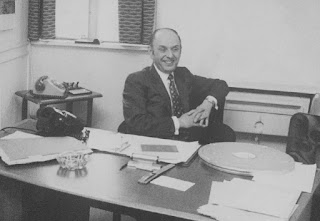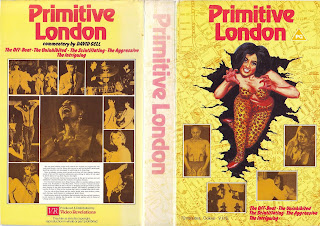The fact that few people getting into exploitation and grindhouse movies these days have ever heard the name Bill Landis is nothing short of a travesty. One that the book ‘Landis: The Story of a Real Man on 42nd Street’ seeks to rectify.
If Bill Landis is remembered by the average cineaste today, it is for
his 2002 book ‘Sleazoid Express: A Mind Twisting Tour through the Grindhouse
Cinema of Times Square’, but Landis’ writing and the Sleazoid name (a concatenation
of ‘sleaze’ and ‘celluloid’) dates back to June 1980. It was then, in NYC, that
Landis began Sleazoid Express as a newsletter, initially documenting his
viewing activities on 42nd Street, before expanding it into a zine
that went on to include his misadventures in drug use and porn acting. Time hasn’t been kind to many of those early
grindhouse zines. These days when whole
books, audio commentaries and documentaries are dedicated to once obscure
horror and exploitation films, those tiny, capsule reviews in no-frill zines,
written at a time when information on such movies was still in its infancy, are
hardly going to pass muster with a 21st century audience. Sleazoid Express, on the other hand, has
grown into a vital, warts and all, historic document of the heaven and hell of
42nd Street, a window into a world that no longer exists, and now
can only be experienced through the rented eyes of those who were around back then. When it came to giving you the lowdown on
what it was like to take your life in your own hands by entering those movie
theatres, befriending the area’s most extreme characters or embarking on a porn
career in the dying embers of the porno chic era, those early Sleazoids leave
you in no doubt that the rented eyes of Bill Landis were the best in town. The original run of Sleazoid Express went out
with a bang in 1985, with the incredible “Ecco: The Story of a Fake Man on 42nd
Street” issue (from which this book gets its name). Entirely about Landis’ descent into drug use
and porn acting, with Landis referred to throughout as ‘Joe Monday’ or ‘The
Quiet Man’, Ecco also proved eerily prophetic of Landis’ own death, from a
heart attack at the age of 49. “The
Quiet Man died at the movies Sunday night of an apparent heart attack. Witnesses claim it happened during a revival
house showing of The Magic Christian, a 70s sex comedy with Racquel Welch and
Ringo Starr. The scene in particular was
one in which Ringo is lording over a slave ship comprised of semi-naked women
clad in fetishistic outfits. It was
around this time the quiet man gasped ‘Its better...better than the stills...’
and, clutching his chest, fell from his seat dead”.
Its impossible to be exposed to Landis’ work and not end up a little bit
obsessed by the man himself and the times he inhabited. Preston Fassel, the author of Landis: The
Story of a Real Man on 42nd Street, is a man who has been bitten by
the Landis bug more than most. Spending several
years chasing Landis’ ghost and putting together as comprehensive a document of
Landis’ life as is humanly possible. A
complex character with an often combative personality (to put it mildly) Landis
left a legacy of broken relationships, bad memories and ill feelings, and as
such those who knew him haven’t exactly been falling over themselves to talk
Landis and Sleazoid in the years since his death. As Fassel notes, the Covid-19 pandemic and
the death of Landis’ arch-nemesis Joel M Reed (director of Bloodsucking Freaks)
proved the catalyst that shook the old guard into contemplating their own
mortality and opening up about the past “the other survivors were suddenly
eager to make sure their stories of that time got to live on”.
Talking Bill here are fellow early 1980s zine publishers Michael J
Weldon (Psychotronic), Jim Morton (Trashola), film collector Ron Roccia (of
‘Mad Ron’s Prevues from Hell’ trailer compilation fame) as well as journalist
Kurt Loder, whose Rolling Stone article helped publicise the zines of Landis
and Weldon. Representing the second wave
of exploitation film zines are Art Ettinger (Ultra Violent), Keith Crocker (The
Exploitation Journal) and Mike McPadden (Happyland). Curiously, Landis is remembered as competitive
and critical of the rival zines that were around during Sleazoid’s first run- particularly
Rick Sullivan’s Gore Gazette- “they couldn’t stand each other” recalls Weldon
of Landis and Sullivan, yet encouraging and supportive of the ones that followed
Sleazoid’s initial demise.
Covid-19 and the death of Joel Reed (once described to me in an email
from Landis as “a venal, non-human”) may have prized open the jaws of many, but
there are still a few notable no-shows in this book. Attempts to involve Landis’ widow and latter
day co-writer Michelle Clifford clearly met with radio silence. Likewise Fassel got no dice from Landis and
Clifford’s daughter, Victoria ‘Baby Sleazoid’ Landis, while Jimmy McDonough
–Landis’ main collaborator during the original 1980-85 Sleazoid run- also pled
the fifth. The absence of Clifford is
perhaps to be expected, given that she totally dropped out of the public eye
several years ago, but the lack of input from McDonough –who has hardly been
tight lipped about Landis and Sleazoid in recent interviews- is more
surprising. As such, Landis: The Story
of a Real Man on 42nd Street, does contain several empty spaces in the
Landis story, that leaves both the reader and Fassel himself wanting to know
more, but coming up against a brick wall.
That isn’t to say there aren’t many new revelations that Fassel brings
to the table here. The rise and fall of
the original incarnation of Sleazoid Express may be a well told tale, but
Fassel breaks new ground when it comes to charting the Landis story following
the 2002 Sleazoid book. A heartbreaking,
but eye opening, final act that Fassel manages to piece together thanks to the acquisition
of Landis’ final, unpublished work. A
semi-autobiographical novella called ‘Last Exit in Manhattan’ that finds Landis
embracing Catholicism, suffering a relapse into drug addiction, being separated
from his wife and daughter, a stint in psychiatric care and embarking on a new
career as a lookout for a Dominican drug gang.
A fate that even Landis’ worst enemy (and there sure were enough
competitors for that title) may have thought twice about wishing upon him. Against considerable odds, Landis: The Story
of a Real Man on 42nd Street, therefore represents Fassel’s attempt
to write something of a happy ending for Landis, by bringing the man and his
writing back into the public conscious. In
Fassel’s eyes Landis was a great American writer, whose work has for too long
been the subject of neglect and scorn. Fassel has nothing but praise for Landis’
writing, describing the Sleazoid book as “the apotheosis of all of Bill’s
writing on the deuce and exploitation cinema”.
He also paints Landis as a man who was ahead of his time, especially
when it came to LGBT issues, and was crucified because of it. Landis was championing gay filmmaker Andy
Milligan, and singing the praises of gay pornographer Toby Ross in the pages of
Sleazoid, at a time when the majority of horror/exploitation focused
publications either refused to touch gay themed material, or regarded it with
homophobic contempt. It’s a stance that,
Fassel claims, led to Landis’ quick fall from grace within the early pages of
Fangoria magazine. While an interview
with Andy Milligan made it into the magazine (and is re-printed at the end of
this book for the first time since 1982) a proposed piece about the films of
Toby Ross went down like a lead balloon with ‘Uncle’ Bob Martin, the then
editor of Fangoria. Martin becomes quite
the villain of the piece in Landis: The Story of a Real Man on 42nd
Street, where it is suggested Martin was so incensed by the Ross article that
he not only forever blacklisted Landis from the pages of Fangoria, but pestered
other magazines into following suit. Thus,
depriving Landis of any chance of a mainstream writing career. While this goes unmentioned in the book, it is
worth noting that Martin’s vendetta against Landis also spread to the film Geek
Maggot Bingo (1983) in which Martin briefly appears as a character based on
Landis, a fact explicitly acknowledged in the end credits of that film “Bill
Landis imitation courteousy (sic) of Bob Martin”.
Landis: The Story of a Real Man on 42nd Street emerges as a
far more compassionate portrayal of the man than has come across in recent
books which have touched on the subject, such as Xerox Ferox (about the 1980s
fanzine scene) and Bloodsucking Freak: The Life and Films of the Incredible
Joel M Reed, which finally saw Reed break his silence and give his side on his
legendary feud with Landis. Perhaps
mindful of selling Landis to a modern, politically correct audience, Landis:
The Story of a Real Man on 42nd Street, side steps some of the more outrageous
Landis stories that are out there. Those of the type that risk turning him into
an object of ridicule, or that may prove counterproductive in a book that sets
out to praise rather than bury him. So,
no mention of the perversely amusing story about Landis’ cross-dressing
impersonation of Jimmy McDonough’s girlfriend (hilariously recounted by
McDonough himself in Xerox Ferox) and the perverse but not so amusing story about
Landis’ online harassment of late 00’s internet personality Nekromistress
(alluded to in Mike McPadden’s 2008 obit of Landis, and which I can still
vividly recall seeing played out all over the internet).
If there is a downside to Landis: The Story of a Real Man on 42nd
Street, and it isn’t at all the fault of the book or Fassel himself, it is that
it creates a hunger for Landis’ original writing that a Sleazoid newbie will
find hard to satisfy. While the Sleazoid
book remains readily available, ‘Anger’ Landis’ 1995 biography of underground
filmmaker Kenneth Anger has slipped out of print, and issues of Sleazoid
Express itself have become rare as hen’s teeth, even in reproduced form. As this book hints, attempts to have them
officially re-printed in book form are currently being stonewalled by certain
parties. Leaving the bulk of Landis’
writing in limbo “for reasons that have as much to do with the legal as they do
with the esoteric”.
Bringing Sleazoid back from the brink might be beyond everyone’s reach at the moment, but Fassel isn’t prepared to let Landis be forgotten without a fight. As an exercise in raising Landis’ profile, and attempting to restore his status as an important, if not THE most important commentator on exploitation cinema, Landis: The Story of a Real Man on 42nd Street, is a commendable piece of investigative journalism, delivered with a massive amount of heart and love for the man. All these years on from Ecco: The Story of a Fake Man on 42nd Street, everybody’s (still) talking about ‘Joe Monday’.


















